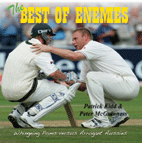Patrick Kidd and Peter McGuinness
224pp
£9.99
I should make a declaration. Patrick Kidd, self-proclaimed “short-sighted tubby lad” (like Andrew Flintoff without the glasses!), is a friend and frequent drinking partner of mine (though he hasn’t yet kicked over one of my beers at a cricket match). I enjoy his work in The Times and on his blog Line and Length and I enjoy his company. We are nearly the same age so have many shared memories of cricket and other things in life. Patrick’s comment on how it seemed “inconceivable” (p.12) in his teenage years that were would ever be a British government run by a party other than the Conservatives strikes a chord with this reviewer (C minor, probably). We have suffered together. “England cannot win when I’m in the country,” admits Patrick. I know the feeling. He was in Madrid when England won the 2003 Rugby World Cup; I was in Pretoria. (Of course, I am happy to go to South Africa if it means an England victory).
Peter McGuiness is a “professional Aussie bar-room pontificator.” Curiously, the two authors have not yet met (p.10). The editorial marriage of minds here evokes one of those passionate cyber relationships that sometimes develop between lonely souls that spend too much time online (like journalists and bloggers), though we hope there will not be too much disenchantment when Patrick and Peter do finally meet. The book is loosely epistolary, with the two authors trading views on captaincy, national anthems, sporting psyches and much more.
The two writers are both true to their backgrounds. Peter uses more robust language than Patrick—there is an amusing definition of “bastard” on p.18—and his ten examples of English/Aussie semantics is oh so true: “Michael Vaughan saying ‘f***’ – ‘plucky fighter’; Steve Waugh saying ‘f***’ – ‘ill-tempered’” (p.27). The hypocrisy of the UK press with this sort of thing is sometimes deplorable. Peter also has a go at the truly crass sale of “memorabilia” via ads during domestic TV coverage of Australian matches: “Tony Grieg has to flog the last 3,123 limited edition, exclusively signed and numbered lithographs depicting Michael Hussey’s fabulous throw from deep backward square against Bangladesh A in Darwin” (p.68). Thank goodness UK coverage has not descended to this.
The essential difference in the English and Aussie sporting mindsets is encapsulated in the Australian phrase, “Show me a good loser and I’ll show you a loser” (p.40). Contrast this to Patrick’s English self-deprecation throughout the book. As Peter points out, “(In English sport) to do all things in pursuit of lasting excellence is to court ridicule for hubris” (p.46). He really understands the English fear of success and the assumption that winning always leads to the Tall Poppy Syndrome.
Patrick knows his stuff. Many people will recall that in 1988 England used 23 players and four captains in five Tests against the West Indies but how many would know that 24 players and three captains were used in 1966 against the same opposition? (p.73). Patrick describes amusingly on p.64 our mutual friend “Lawrence” and his matchday habits (late arrival and enormous sandwiches), though probably he is not helping his chances of joining the MCC by suggesting that “MCC members enjoy a spot of cricket between the important matters of lunch and tea” (p.170).
Peter’s “Schmingland First XI” is mainly composed of Saffas (Smith, Pietersen, Grieg etc) but he might have nailed some more distinguished names than Martin McCague or Devon Malcolm. How about Italian-born Ted Dexter, Indian-born (to Scottish parents) Douglas Jardine or, best of all, Sydney-born Gubby Allen (though he is mentioned on p.77)? The Welsh Simon Jones is there but not the Scot Mike Denness (p.31).
Patrick’s view of cricket as the “Australian antidote for depression” (p.124) is probably even more pertinent now in these benighted times. So if the 1929 Wall Street Crash heralded the arrival of Bradman and Black Wednesday in 1992 was just a couple of days after Shane Warne’s debut, what might the 2008 credit crunch pertain? At the moment, having watched England’s annihilation in the Headingley Test, perhaps Mitchell Johnson’s renaissance.
I found only one error. England won by two runs at Edgbaston in 2005, not three (p.23)—a surprising mistake, considering how famous that victory has become. A few red herrings have crept in, too. The picture caption on p.80 asks, “Was there ever a better-initialled England Captain? MCC Cowdrey,” which suggests that Cowdrey’s initials were actually MCCC. The image reproduction is disappointing but this is not meant to be a showcase for cricket photography. After all, it costs only a tenner.
Patrick’s description of this amusing and entertaining book as “a hotch-potch of essays, lists and random thoughts” (p.10) is a perfect summary. It is a worthy addition to Know The Score’s increasingly excellent list of cricket titles.